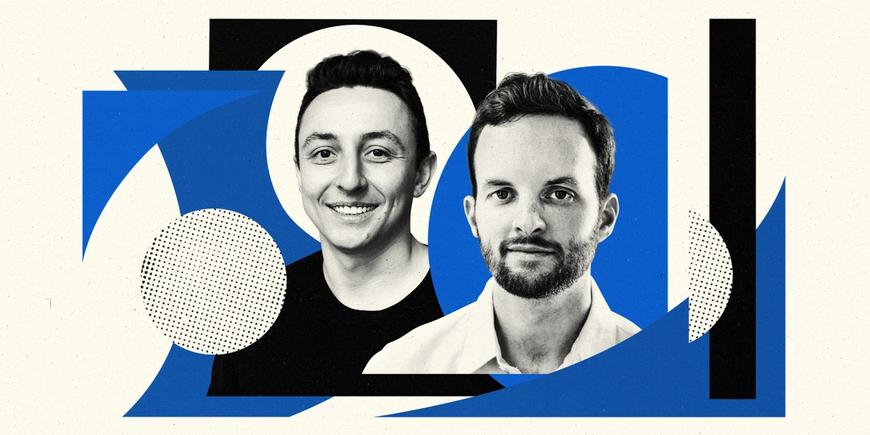Ribbon Health’s Nate Maslak: ‘Be Completely Rigid and Uncompromising on Values When Building Your Business’
The healthcare tech CEO on his “aha” moment, surviving a pivot, and the importance of leading a values-driven business.

Ribbon Health CEO and Cofounder Nate Maslak isn’t afraid to pick up the phone and talk to customers. When the company needed to pivot, he and his cofounder spent a month interviewing 100 potential buyers—digging into their pain-points even when the conversation felt like a dead-end.
“Thirty seconds in, you're like, ‘Oh, there's nothing here,’” he says. “But you need to find a way to have that empathy, and build conviction."
Not only did the interviews steer their strategy, it helped them land some of their first new customers post-pivot.
I spoke with Nate to hear more about Ribbon Health’s journey, its 2022 goals, and his best advice for early-stage founders.
For people who aren’t familiar with Ribbon Health, what is the core problem you’re solving, and how are you tackling it?
Our vision as a company is to power every care decision to be convenient, cost effective and high quality. The way we do this is with a backend infrastructure and data asset. At its simplest, Ribbon is just data and distribution—data that we distribute across the ecosystem on providers and doctors, the initial cost, accepted insurance plans, and the performance of that provider. Our goal is to provide an automated, personalized match for every sick patient.
What’s the founding story behind Ribbon Health?
We started out as a care navigation platform and our whole thesis was, “Can you find a scalable way to engage people to steer and navigate care in a digital-first manner?” We started selling to employers and people loved the product. We had a really high NPS of 80 with 90% month-over-month engagement. We were like, "We've cracked healthcare navigation."
Obviously we had not. Our customers started calling in and our NPS and engagement plummeted. We had people saying, "Hey guys, I went to go see a doctor and I showed up at a bank. What is wrong with your product?" Or, "I was at the doctor. You said I was in-network, and they told me I wasn't. I got turned away." Or worse, people risked getting hit with out-of-network bills. We realized we had this data integrity problem on our hands.
So we decided to use the same principles that my co-founder and I learned at our previous job, which were focused around predictive analytics. We started to pre-dock their data, and then a bunch of our competitors started asking to license that information from us. This was the big “aha” moment. Four years ago, we shifted directions, spun up an API, and became Ribbon Health.
What did the transition look like from being a care navigation business to being a data business?
It started manually by downloading a dataset from the government to have data on every provider in the country. We were using the old version of the tool and it was ~50% accurate. Then we realized that if we downloaded a second free database and triaged across the two, we’d reach 54% accuracy, and so on.
The more data you could fit into the model the better it got — it's a perfect machine learning problem. And so that's what we've done since. We're aggregating data from over 1,000 different data sources.
Just to give you an idea, we have 50 phone numbers per doctor in our system, so the permutations are massive, and our algorithms are picking up how likely something is to be right or wrong. How likely is this doctor to be at 123 Main Street? How likely are they to accept that plan or to do this type of procedure for these types of patients?
And then do you augment that with a call center?
We do have our own call center. But I think what's really unique about Ribbon is that our customers are also driving network effects for us. As a customer, there's real value in updating information. Every customer gets a private copy of Ribbon data that they can update, edit, change, and do what they want with. All of our customers are using some version of data editing in some way which strengthens our algorithms. We think that our customers are building their own solution and Ribbon Health provides the building blocks for it.
As you’ve scaled the business and found product market fit, can you give us some insight into your sales process?
For the first few years, I was banging on as many doors as possible. We did this for a while, and it actually worked very well, but it doesn't scale. We focused primarily on digital health, working with people who were building brand new solutions. As our product has continued to mature, we’ve expanded into health plans, provider groups, telemedicine companies, and hospital systems—across patient-facing or digital health solutions.
The challenge with that is there are different types of buyers. They all buy the same product, but they use it in slightly different ways. So now we've built enterprise sales teams that focus across these segments and really have empathy for the specific problems that these people have.
At the end of the day, it all comes down to solving the problem for the patient. And I'm a believer that people who work in healthcare, in some form or another, deeply care about this patient problem. I think at the very least, we can all agree that no matter what the incentive structure is, you don't want somebody showing up at a bank when they’re trying to get care for themselves.
When thinking back to those founder-led sales days, would you do anything differently?
I think I would try to do more of it, and do it faster to learn more. When we decided to pivot, leaving revenue on the table was a big risk, so we wanted to make sure that the problem was really painful. So we spent 30 days having at least 100 conversations with potential buyers, and they were all over the map at first. Thirty seconds in, you're like, "Oh, there's nothing here." But you need to find a way to have that empathy, and build conviction. Actually, one of our customers came from a conversation where I first thought, "There's nothing here." That was a big lesson for us.
The other thing that I would've done differently is to hire people sooner to go deeper on those potential segments at a faster rate.
Now that you’re at a larger scale with a recent fundraise, what are the big hurdles you're now focused on in 2022?
The first priority is to go after the things we do really well. There’s no reason why a digital health entrepreneur should not be working with Ribbon. We have to earn the right.
The second priority, on the go-to-market front, is taking really targeted exploration. We have to keep launching new products, and we have to enter new segments, because that's how you power every care decision. So we’re choosing really thoughtfully, “What are the bets that we want to take? Where do we deploy our exploratory resources?”
And the third is figuring out how to scale the company based on a values-first, functional-aptitude-second mentality.
What’s a piece of advice you’d want to give to new healthcare founders on day one?
Be completely rigid and uncompromising on values when building your business. It’s really important to know that your values are both thoughtful and an authentic representation of the company you want to build.
Having the discipline to say “no” is more powerful than any other decision that an entrepreneur can make, especially at the early stages.
